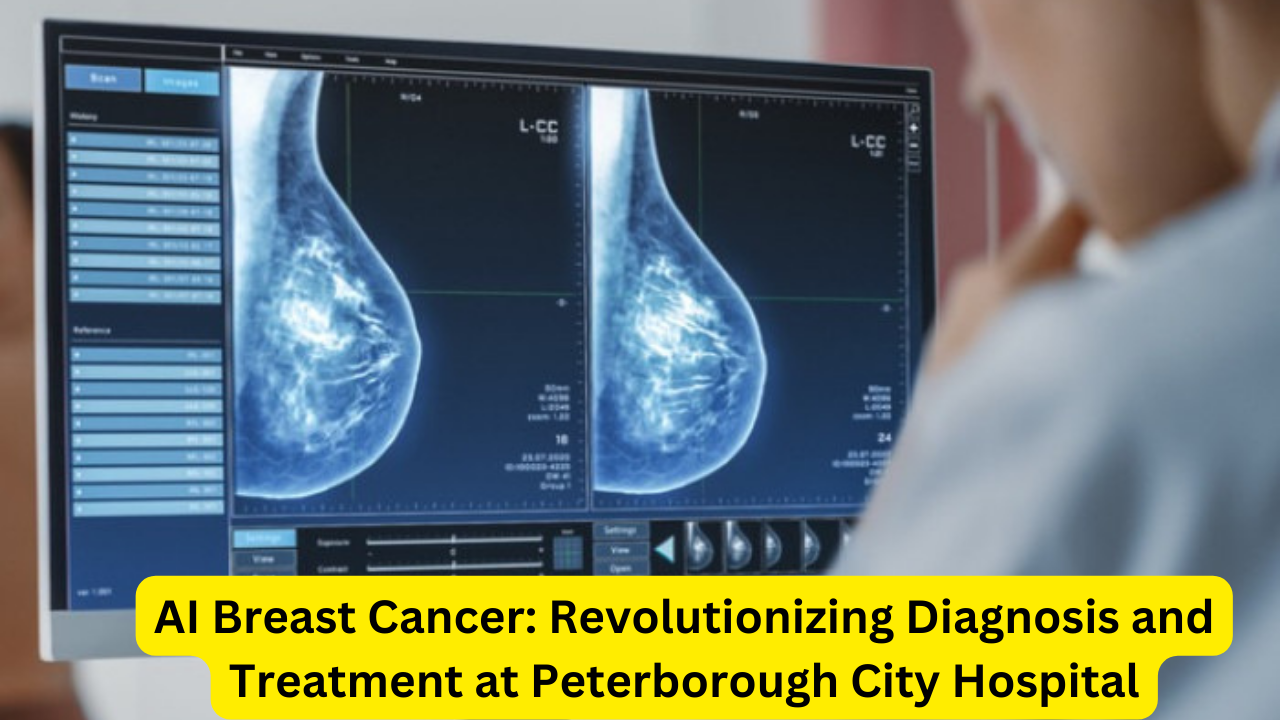AI Breast Cancer Revolutionizing Diagnosis

AI Breast Cancer Revolutionizing Diagnosis. Specialists at Peterborough City Hospital have embarked on a groundbreaking trial using artificial intelligence (AI) to revolutionize the diagnosis and treatment of breast cancer. This 12-month trial, conducted by the North West Anglia NHS Foundation Trust, employs an AI-powered diagnostic tool developed to enhance the analysis of biopsies. Dr. David Bailey, a pathologist at the hospital, describes the tool as an “exciting breakthrough” in the fight against breast cancer.
The AI breast cancer analysis trial at Peterborough City Hospital represents a significant step forward in the integration of technology in medicine. With its potential to improve accuracy, speed up diagnosis, and support personalized treatment plans, AI is poised to become an invaluable tool in the fight against breast cancer. As the trial progresses, the healthcare community eagerly anticipates more data that will undoubtedly shape the future of cancer care.
AI in Breast Cancer Diagnosis: How It Works
Understanding the AI-Powered Diagnostic Tool
The AI-powered diagnostic tool at the heart of this trial uses sophisticated algorithms to analyze biopsy samples with unprecedented accuracy. By examining digital images of tissue samples, the AI software identifies patterns and markers that might be missed by the human eye. This tool is designed to assist pathologists in making more precise and faster diagnoses, ultimately improving patient outcomes.
Benefits of AI in Breast Cancer Diagnosis
- Increased Accuracy: The AI tool can detect subtle changes in tissue that may indicate the presence of cancer, reducing the risk of misdiagnosis.
- Faster Results: By automating parts of the diagnostic process, the tool speeds up the time it takes to reach a diagnosis, which is crucial for starting treatment as early as possible.
- Consistency: AI provides a standardized approach to diagnosis, minimizing human error and variability in interpretations.
The Role of Peterborough City Hospital in the AI Trial
Peterborough City Hospital is at the forefront of this innovative trial, with a dedicated team of specialists working closely with the AI software developers. The hospital’s involvement underscores its commitment to integrating cutting-edge technology in patient care. The trial aims to assess the tool’s effectiveness in a real-world clinical setting, providing valuable data that could pave the way for wider adoption of AI in healthcare.
Case Studies and Preliminary Results
Patient Success Stories
Early results from the trial are promising, with several patient success stories highlighting the potential of the AI tool. One patient, diagnosed through the AI-enhanced process, received treatment earlier than she would have through traditional methods. Her case exemplifies how AI can lead to timely interventions and better prognoses.
Statistical Outcomes
Initial data from the trial indicate a significant increase in diagnostic accuracy. Pathologists using the AI tool reported a 15% improvement in identifying malignant tissues compared to traditional methods. These findings suggest that AI could play a crucial role in reducing the incidence of false negatives and ensuring that patients receive the correct diagnosis more reliably.
Pathologist Dr. David Bailey’s Perspective
Dr. David Bailey, a key figure in the trial, has been vocal about the transformative potential of the AI tool. He notes that while human expertise remains irreplaceable, AI offers a powerful complement to the skills of pathologists. According to Dr. Bailey, the AI tool enhances the diagnostic process, allowing doctors to focus on more complex cases and patient care.
Future Implications of AI in Breast Cancer Treatment
Beyond Diagnosis: AI in Treatment Planning
The benefits of AI extend beyond diagnosis. Future applications of AI in breast cancer treatment could include personalized treatment plans based on individual patient data. By analyzing vast amounts of data, AI can help oncologists determine the most effective treatment protocols, potentially improving survival rates and quality of life for patients.
AI and Continued Research
The success of the trial at Peterborough City Hospital is likely to spur further research into AI applications in oncology. Continuous advancements in AI technology promise to bring more sophisticated tools to the forefront, further enhancing the capabilities of healthcare professionals.
Conclusion: A Promising Future for AI in Healthcare
The AI breast cancer analysis trial at Peterborough City Hospital represents a significant step forward in the integration of technology in medicine. With its potential to improve accuracy, speed up diagnosis, and support personalized treatment plans, AI is poised to become an invaluable tool in the fight against breast cancer. As the trial progresses, the healthcare community eagerly anticipates more data that will undoubtedly shape the future of cancer care.




